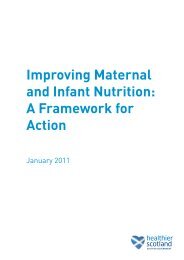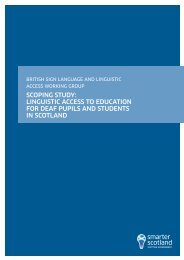- Page 1: TheCarloway ReviewReport andRecomme
- Page 4 and 5: highly disruptive to the system gen
- Page 9: LIST OF ABBREVIATIONS1995 Act The C
- Page 13 and 14: 1.0 INTRODUCTIONBackground1.0.1 In
- Page 15 and 16: a solicitor” prior to, and at any
- Page 17 and 18: ole of the Group was to provide the
- Page 19 and 20: of the points made at each of these
- Page 21 and 22: Topics outwith the scope of the Rev
- Page 23: Convention, describes the overall v
- Page 27 and 28: under the care of a “disintereste
- Page 29 and 30: Lord Justice General referred to th
- Page 31 and 32: 2.0.9 The retreat from Chalmers was
- Page 33 and 34: “…Society must make up its mind
- Page 35 and 36: 2.0.18 The recommendations of the T
- Page 37 and 38: would often have to take place outw
- Page 39 and 40: 2.0.25 The common law concept of fa
- Page 41 and 42: McLean2.0.30 The applicability of S
- Page 43 and 44: “Accordingly, provided that we ar
- Page 45 and 46: Cadder had never been the subject o
- Page 47 and 48: “to provide principled solutions
- Page 49 and 50: for example, referred to there not
- Page 51 and 52: 3.0 CONVENTION CONSIDERATIONSIntrod
- Page 53 and 54: privilege against self-incriminatio
- Page 55 and 56: suspect’s right to liberty. Howev
- Page 57 and 58: 3.0.13 The protections afforded by
- Page 59 and 60: offended the basic principles of a
- Page 61 and 62: Rights of the Victim3.0.20 There is
- Page 63 and 64: 4.0 THE PROPOSED CHANGES - AN OVERV
- Page 65 and 66: of all affected by the system to ac
- Page 67 and 68: ebuttable, in favour of a person’
- Page 69 and 70: 4.0.12 The Review has been particul
- Page 71: police, but the Review has stepped
- Page 74 and 75:
5.0.3 The Review is not tasked to e
- Page 76 and 77:
unnecessarily in police custody; th
- Page 78 and 79:
has looked at the present utility o
- Page 80 and 81:
suspect. But once the sheriff’s i
- Page 82 and 83:
contingent on the existence of evid
- Page 84 and 85:
maximum by prompting the extension
- Page 86 and 87:
In practice there are few challenge
- Page 88 and 89:
commented 30 the Review considers t
- Page 90 and 91:
of bringing a suspect before the co
- Page 92 and 93:
questioning a suspect prior to his/
- Page 94 and 95:
5.1.33 The police require to consid
- Page 96 and 97:
the police officer is of the view t
- Page 99 and 100:
5.2 PERIOD OF CUSTODYIntroduction5.
- Page 101 and 102:
This provision is directory rather
- Page 103 and 104:
Thus, prior to the 2010 Act, if a s
- Page 105 and 106:
for another thirty-six hours 13 , b
- Page 107 and 108:
delay; (b) the period is reasonably
- Page 109 and 110:
the detention period, whether that
- Page 111 and 112:
even witness statements require gre
- Page 113 and 114:
that the need to extend detention f
- Page 115 and 116:
through the business and this is a
- Page 117 and 118:
work. The Review does not pretend t
- Page 119 and 120:
ut relative to suspects who have be
- Page 121 and 122:
a review should not be carried out
- Page 123 and 124:
RecommendationsI therefore recommen
- Page 125 and 126:
5.3 LIBERATION FROM POLICE CUSTODYI
- Page 127 and 128:
Current lawSuspect at Liberty5.3.4
- Page 129 and 130:
may be possible to challenge these
- Page 131 and 132:
procurator fiscal. If released with
- Page 133 and 134:
liberation conditions. The sheriff
- Page 135 and 136:
elease the suspect on the type of c
- Page 137 and 138:
6.0 INVESTIGATION CHAPTERS OVERVIEW
- Page 139 and 140:
continue to be no statutory provisi
- Page 141 and 142:
the trial process. Indeed, question
- Page 143 and 144:
6.1 LEGAL ADVICEIntroduction6.1.1 A
- Page 145 and 146:
appearance, can only be delayed in
- Page 147 and 148:
conversation with a solicitor, by t
- Page 149 and 150:
when questioned. The official text
- Page 151 and 152:
difficulty in grasping when such si
- Page 153 and 154:
6.1.19 Stipulating that the right t
- Page 155 and 156:
6.1.24 Notwithstanding that EU legi
- Page 157 and 158:
and text contact or other forms of
- Page 159 and 160:
majority of suspects seeking advice
- Page 161 and 162:
6.1.34 There may be exceptional cir
- Page 163 and 164:
experience in England and Wales 35
- Page 165 and 166:
Types of advice6.1.40 Subject to wh
- Page 167 and 168:
Convention jurisprudence requires b
- Page 169 and 170:
statements made during questioning
- Page 171 and 172:
6.2 QUESTIONINGIntroduction6.2.1 Th
- Page 173 and 174:
explain to the witness that he/she
- Page 175 and 176:
will provide a sufficient basis on
- Page 177 and 178:
least to see if he/she was involved
- Page 179 and 180:
of unnecessary repetition of quotat
- Page 181 and 182:
eason of repetition, accusation and
- Page 183 and 184:
he/she might have to speak to in co
- Page 185 and 186:
view to assessing the veracity of t
- Page 187 and 188:
the right to a fair trial per se. I
- Page 189 and 190:
voluntarily made 44 but this is ove
- Page 191 and 192:
ConsiderationThe witness6.2.41 Ther
- Page 193 and 194:
6.2.45 The proposed regime for cust
- Page 195 and 196:
6.2.48 The fact that new evidence c
- Page 197 and 198:
6.2.53 The decision to make such an
- Page 199 and 200:
the interests of legal clarity, it
- Page 201 and 202:
Pre-interview briefing6.2.62 Prior
- Page 203 and 204:
RecommendationsI therefore recommen
- Page 205 and 206:
6.3 CHILD SUSPECTSIntroduction6.3.1
- Page 207 and 208:
committed by an adult, would normal
- Page 209 and 210:
either a nominated or duty solicito
- Page 211 and 212:
child on an undertaking of a simila
- Page 213 and 214:
6.3.14 Paragraph 16 of the ACPOS Ma
- Page 215 and 216:
proffered 30 . If arrested, the chi
- Page 217 and 218:
PACE does not provide a different r
- Page 219 and 220:
6.3.23 As has been described earlie
- Page 221 and 222:
the child’s day to day care. It a
- Page 223 and 224:
persons of 16 years of age and over
- Page 225 and 226:
⎯ where the child is 16 or 17 yea
- Page 227 and 228:
6.4 VULNERABLE ADULT SUSPECTSIntrod
- Page 229 and 230:
simply testifying with a screen in
- Page 231 and 232:
The use of an appropriate adult is
- Page 233 and 234:
the suspect and identify any proble
- Page 235 and 236:
problems exist in current practice
- Page 237 and 238:
7.0 EVIDENCE CHAPTERS OVERVIEW7.0.1
- Page 239 and 240:
particular comment and, no doubt, c
- Page 241 and 242:
7.0.10 The Review has been concerne
- Page 243 and 244:
7.1 CORROBORATION - ORIGINS AND DEV
- Page 245 and 246:
and“At the mouth of two witnesses
- Page 247 and 248:
canonical rule on the need for proo
- Page 249 and 250:
legitimated fact-finding and adjudi
- Page 251 and 252:
7.1.15 In England and Wales, juries
- Page 253 and 254:
cases. The Lord Justice General (Cl
- Page 255 and 256:
7.1.21 The chain analogy 52 is not
- Page 257 and 258:
7.2 CORROBORATIONIntroduction7.2.1
- Page 259 and 260:
are likely to be so serious, that i
- Page 261 and 262:
7.2.9 Where then has the law reache
- Page 263 and 264:
these facts do make the first witne
- Page 265 and 266:
proved by corroborated testimony, m
- Page 267 and 268:
single act of indecency was corrobo
- Page 269 and 270:
(of which it is a variant) needs to
- Page 271 and 272:
Other Jurisdictions7.2.24 Common la
- Page 273 and 274:
7.2.26 Some other common law jurisd
- Page 275 and 276:
Empirical Research7.2.29 In Februar
- Page 277 and 278:
judged that 268 of the 458 cases co
- Page 279 and 280:
wrong. A witness can be unreliable,
- Page 281 and 282:
in cases of the type currently pros
- Page 283 and 284:
years apart 72 . Furthermore, espec
- Page 285 and 286:
Corroboration and the civil law7.2.
- Page 287 and 288:
consider all relevant evidence and
- Page 289 and 290:
7.3 SUFFICIENCY OF EVIDENCEIntroduc
- Page 291 and 292:
agreed, he/she would accede to the
- Page 293 and 294:
perpetrator was the accused, the de
- Page 295 and 296:
to determining whether the jury cou
- Page 297 and 298:
“unsafe” to convict is not a te
- Page 299 and 300:
7.3.16 The “lurking doubt” test
- Page 301 and 302:
some testimony that (i) the crime c
- Page 303 and 304:
7.4 EXCULPATORY AND MIXED STATEMENT
- Page 305 and 306:
7.4.4 The concerns about using excu
- Page 307 and 308:
7.4.6 A decade later yet further re
- Page 309 and 310:
exclude a prepared exculpatory writ
- Page 311 and 312:
considered that his statements were
- Page 313 and 314:
investigation, a suspect appeared a
- Page 315 and 316:
analyse evidence properly, they oug
- Page 317 and 318:
7.5 ADVERSE INFERENCE FROM SILENCEI
- Page 319 and 320:
states something positive in respon
- Page 321 and 322:
“There is nothing more obvious to
- Page 323 and 324:
questions. However, it is obvious t
- Page 325 and 326:
time when he/she failed to disclose
- Page 327 and 328:
7.5.19 It has already been noted th
- Page 329 and 330:
speak. His/her right to be silent i
- Page 331 and 332:
8.0 APPEALS OVERVIEW8.0.1 The 2010
- Page 333 and 334:
8.1 APPEAL PROCEDURES“Justice del
- Page 335 and 336:
common for solicitors, who may or m
- Page 337 and 338:
called for, four weeks after the ju
- Page 339 and 340:
to lodge his/her written case and a
- Page 341 and 342:
of Intention to Appeal, the applica
- Page 343 and 344:
8.1.18 In relation to preliminary r
- Page 345 and 346:
fundamental nullity, after the refu
- Page 347 and 348:
Late Appeals (solemn cases)8.1.24 W
- Page 349 and 350:
8.1.29 If the application for leave
- Page 351 and 352:
place for Bills of Suspension and A
- Page 353 and 354:
egard to the need for certainty and
- Page 355 and 356:
(iii)discussions on whether to gran
- Page 357 and 358:
8.2 FINALITY AND CERTAINTYIntroduct
- Page 359 and 360:
amendment to his/her Note of Appeal
- Page 361 and 362:
used by the High Court in determini
- Page 363 and 364:
extends to whether the Court consid
- Page 365 and 366:
application such as whether, despit
- Page 367 and 368:
eferred, but the figures do provide
- Page 369 and 370:
Review is content to note that ther
- Page 371 and 372:
RecommendationsI therefore recommen
- Page 373 and 374:
Annex AResearch Report:The Impact o
- Page 375 and 376:
Annex AAim of the researchThe Revie
- Page 377 and 378:
Annex ATable 1TotalSufficient witho
- Page 379 and 380:
Annex A⎯ The numbers of cases whi
- Page 381 and 382:
Annex BCarloway Review Process Maps
- Page 383 and 384:
Annex BRight of access to a lawyer
- Page 385 and 386:
Annex BLiberty / custody procedureY
- Page 387 and 388:
Annex CPre Trial Detention in the E
- Page 389 and 390:
Annex DCARLOWAY REVIEW REFERENCE GR
- Page 391 and 392:
Annex EVISITS AND MEETINGSVisitsThe
- Page 393 and 394:
Annex EObservingThe Review observed
- Page 395 and 396:
Annex EConsultative Meetings - cont
- Page 397 and 398:
Annex ESubgroup & individual meetin
- Page 399 and 400:
Annex ERoadshowsThe Review held fiv
- Page 401 and 402:
Annex FCONSULTEESIn order to ensure
- Page 403 and 404:
Annex GMATERIALS REFERRED TO IN THE
- Page 405 and 406:
Annex GDirectives, Reports and Guid
- Page 407 and 408:
Annex GScottishAdamson v HM Advocat
- Page 409 and 410:
Annex GPeggie v Clark (1868) 7 M 89
- Page 411 and 412:
Annex GR(on the application of the
- Page 413 and 414:
Annex GArticlesTitle Author Publish
















